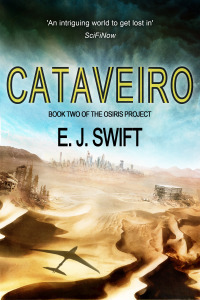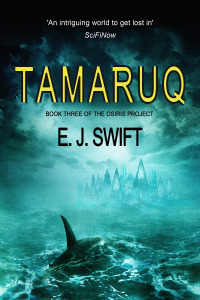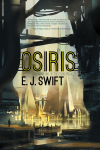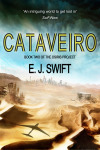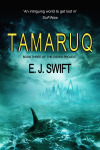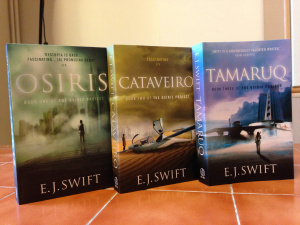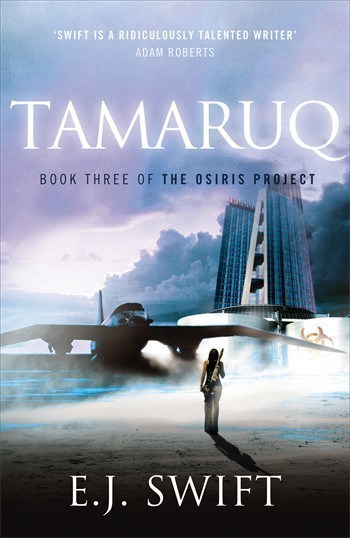E.J. Swift's Blog, page 4
August 3, 2015
Fantasy in the Court and Nine Worlds 2015
I’m looking forward to two events this week – on Thursday 6 August, I’ll be at Fantasy in the Court in the evening alongside a host of SFF writers. Fantasy in the Court is hosted by the marvellous Goldsboro Books (Cecil Court, London) in association with Hodderscape. Find out more and book tickets here.
Friday 7 – Saturday 9 August is Nine Worlds Convention at the Radisson Blu Edwardian, Heathrow, London. This is my first time at Nine Worlds; according to the website: “It’s about gaming, film, cosplay, fandom, literature, science, geek culture, meeting people and having a really big party.” (Sounds good to me.) I’ll be there Saturday and Sunday and participating in a panel on Sunday afternoon:
“The Stars My Destination” – Exploring the Future of SF – 1.30pm – 2.45pm, Sunday 9 August
We’re living in a science fiction world, where technology and global warming are changing things faster than sci-fi writers can type: so where does the future of sci-fi sit?
Gavin G Smith, Paul McAuley, E. J. Swift, Matt Suddain, Naomi Foyle
Exciting! You can find out more about Nine Worlds here.


June 10, 2015
In conversation with Speculative Fiction Author Anne Charnock

Anne Charnock
I met Anne Charnock (@annecharnock) last summer when we shared a panel at LonCon 3, with David Hebblethwaite and Adam Roberts, discussing writers who cross the boundary between mainstream fiction and science fiction.
Since then, I’ve completed my trilogy, The Osiris Project, and Anne has finished her second novel, Sleeping Embers Of An Ordinary Mind. Anne’s debut novel, A Calculated Life, was shortlisted for the Philip K. Dick Award 2013 and The Kitschies Golden Tentacle 2013.
We felt it was time for a catch-up chat—about past writing and future plans.
Anne—So, E.J., we’ve both written fiction in which climate change is part of our world-building. Tell me how you became interested in this subject and the part it plays in your trilogy The Osiris Project.
E.J.—Climate change was something I’d had a growing interest and awareness of for a few years, and then I read Mark Lynas’s Six Degrees: Our Future on a Hotter Planet, and that was really a game-changer for me. The geo-political scenarios it hypothesizes were at once utterly horrifying but also, from a fiction writer’s point of view, fascinating. I’ve always been drawn to isolated landscapes – the bleak but beautiful. When it came to writing The Osiris Project, I had the world map in mind very early on – a world radically altered by climate change, with borders redrawn and civilization shifted towards the poles. And that underpinned so much of the trilogy, in terms of character, society, political agendas, particularly in the second novel, Cataveiro.
Anne, how important was climate change as you were developing the world of A Calculated Life? Because as a reader, it feels like a noticeable but very subtle element, which I loved – for example, the vineyards, olive and citrus groves surrounding Greater Manchester.
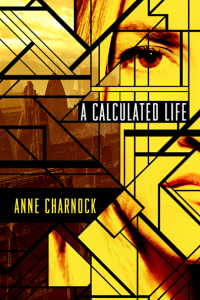 Anne—In any dystopia there are winners and losers—in terms of wealth and freedom—and it’s the same with climate change. I felt it would be interesting to locate my dystopian world in a region benefiting overall from climate change. In my imagined future world, Manchester and the north west of England become the new Tuscany of Europe. I’ve been tuned into climate issues for many years because I studied environmental sciences at the University of East Anglia, home of the Climatic Research Unit. I remember ice-cores being delivered to the department for historical climate analysis. And in 2006, I helped launch the Ashton Hayes Going Carbon Neutral Project in the community where I live. It’s now an exemplar for grassroots action thanks to the community’s enthusiasm. So far we’ve cut our carbon emissions by 25% through behaviour change and we’ve set up a Community Energy Company to generate power from solar energy. Our primary school now has free electricity!
Anne—In any dystopia there are winners and losers—in terms of wealth and freedom—and it’s the same with climate change. I felt it would be interesting to locate my dystopian world in a region benefiting overall from climate change. In my imagined future world, Manchester and the north west of England become the new Tuscany of Europe. I’ve been tuned into climate issues for many years because I studied environmental sciences at the University of East Anglia, home of the Climatic Research Unit. I remember ice-cores being delivered to the department for historical climate analysis. And in 2006, I helped launch the Ashton Hayes Going Carbon Neutral Project in the community where I live. It’s now an exemplar for grassroots action thanks to the community’s enthusiasm. So far we’ve cut our carbon emissions by 25% through behaviour change and we’ve set up a Community Energy Company to generate power from solar energy. Our primary school now has free electricity!
Now that I’ve written two standalone novels, E.J., I’d love to know how you approached writing a trilogy. When did you realize your subject was too big for a standalone novel? And was it instantly clear to you how to break the narrative into three books?
E.J.—I actually wrote Osiris as a standalone novel in the first instance, but when it came to submitting to agents I had a feeling I’d be asked about plans for sequels, and I left the story deliberately open-ended. The only thing I knew about the second book was that the location would move to outside Osiris, with an almost entirely new cast – I didn’t want to end up writing three variations of the same book, but rather to expand the canvas and the narrative points-of-view with each installment. But then I had so much fun with Cataveiro, the challenge in the third book was pulling everything back together, when my mind wanted to be off exploring an entirely different story! I think if I ever did another trilogy (and it’s definitely not on the cards anytime soon) I’d approach it quite differently. I love those trilogies where you might have hundreds, even thousands of years between books. And hopefully I’d be more organized too…
By contrast, I think you’re doing almost the opposite with your current novel, in terms of structure? Can you tell me a bit about the approach you’ve chosen, and why?
Anne—I spent several years mulling over this novel—Sleeping Embers Of An Ordinary Mind—before I settled on the structure. One of my main themes is the nature of success including, more specifically, how women’s achievements have tended to be overlooked. I decided to write three inter-weaving storylines set several hundreds of years apart. A trilogy of sorts!
I hoped this fractured structure would create a sense of immediacy. It’s proved both a challenge and immense fun to write. The settings are Renaissance Florence, present-day China and a future London in which The Academy of Restitutions is attempting to lift women out of undeserved obscurity.
My first novel, A Calculated Life, is dystopian science fiction so, as you can see, I’m now moving into new writing territories—that of contemporary and historical fiction. How do you feel about entering new territory—switching to standalone novels following the success of your trilogy? Do you feel it’s a risk?
E.J.—I’m really looking forward to the era of standalones, I like the containment of the single novel. Of course you can’t guarantee readers who liked one book will automatically be interested in the next, but that goes for series too. I think perhaps the greater risk is moving around genres – the book I’m currently writing has a contemporary setting, and it’s quite different in tone to The Osiris Project books, though it also contains speculative elements. One writer I really admire for this versatility is Genevieve Valentine, whose novels aren’t constrained to any one genre – she’s gone from steampunk circus to 1920s prohibition to future eco-thriller, and seems to be able to turn her hand to any subject material.
I should say I’m a big fan of multilayered and intersecting narratives (writers like David Mitchell, to cite an obvious example) and I absolutely love the sound of Sleeping Embers of an Ordinary Mind. Both of your novels have explored future projections – would you say you’re naturally drawn to the speculative in writing (and in art!), or is this just coincidence?
Anne—I think I’m naturally drawn to speculative writing because it offers a huge canvas. Having said that, I prefer to create plausible scenarios. In my new novel the main characters are connected to the art world—I’m making use of my background as an artist—and two of the main characters are based on real people in Renaissance Italy. I feel the future storyline in my novel is perfectly plausible.
Your current work-in-progress, E.J., brings to mind Ben H Winters’ novel The Last Policeman in terms of setting because Ben’s premise is science fictional but it’s really a contemporary novel! There’s an asteroid hurtling towards Earth and the story imagines how people react when they know the world will end in a year’s time. I find that combination of contemporary fiction and speculative fiction extremely engaging so I can’t wait to see how you bring them together.
Sometimes I test my ideas in a short story—for example, to try out a different style of writing or to find the voice of a character. Your short story “The Spiders of Stockholm” was long-listed for 2015 Sunday Times EFG Short Story Award. Many congratulations. What an achievement! Can you describe the attraction of short form for you?
E.J.—Thanks, Anne! That was the loveliest surprise – I’d completely forgotten my editor had even submitted the story. “The Spiders of Stockholm” was part of the Irregularity anthology from Jurassic London, who are a joy to write for because they always put together such thought-provoking briefs (in this case, the tension between order and chaos in the Age of Enlightenment).
I don’t feel that I’m a natural short story writer, so I like having some ideas to springboard from. But one thing I love about the form is the opportunity to hone your language at the editing stage, whereas with a novel it feels like there’s always something that escapes you. Having said that, some of my favourite novels are short story collections in disguise, like Angelica Gorodischer’s Kalpa Imperial, or Rana Dasgupta’s Tokyo Cancelled, and I’d love to write something in that vein one day.
Have you published your short stories, and if so, where can we find them?
Anne—My short story, “The Adoption”, will be published this autumn in Phantasma an anthology of horror, SF, urban fantasy and paranormal fiction, including stories by J.D. Horn, Roberta Trahan, Kate Maruyama and Jodi McIsaac Martens.
Other than that I’m currently hoarding several drafts of short stories—more like vignettes. They’re on a single theme—how human relationships will be affected by advances in human reproduction technologies. I’m a huge fan of fragmented narratives and I’m now inclined to incorporate these vignettes in larger piece of writing, possibly a full-length novel.
One of my favourite examples of fragmented-narrative writing is Jennifer Egan’s A Visit From The Goon Squad and I’ll definitely read Angelica Gorodischer’s Kalpa Imperial. Thanks for the recommendation. I do feel that short form and split narratives suit me as a fiction writer. It’s possibly a throw-back to my days of rattling off short pieces of journalistic writing. Having said that, short fiction requires a great deal more honing that journalism deadlines ever allowed.
Let’s have another conversation, E.J., when some of our plans have played out. And good luck with your current writing.
Anne’s new novel, Sleeping Embers Of An Ordinary Mind, is published by 47North in November 2015. You can pre-order it here and find out more about her work at her website.


April 7, 2015
Cataveiro and Tamaruq: US ebooks now available
I’m very pleased to share that ebook editions of CATAVEIRO and TAMARUQ, Books Two and Three of The Osiris Project trilogy, are now available in the US. The ebooks are published by JABberwocky Literary Agency and are available on Amazon, Kobo and iTunes (Barnes and Noble to follow shortly). My huge thanks to JABberwocky for giving these books a digital home, and especially to Lisa Rodgers for coordinating their production.
You can find the ebooks via the following retailers:
Cataveiro: Amazon // Kobo // iTunes
Tamaruq: Amazon // Kobo // iTunes
OSIRIS, Book One of The Osiris Project, continues to be published by Night Shade Books and you can find it here:
Osiris: Kindle // Kobo // Nook
The beautiful new cover art for the US editions was created by Ben Baldwin, who I can’t recommend highly enough, and you can find out more examples of his work over at his website here.
Here’s Ben on the process of creating the artwork:
“For most of my work the image starts off as a combination of hand drawn or painted elements and photography. I scan/import these elements into my computer and then use a lot of Photoshop to assemble and create the final image. I also use a Wacom pen tablet which allows me to do some digital drawing directly in Photoshop. So the images are basically a mix of different layers of traditional and digital techniques.”
And here’s the set together – as you can see, Ben’s done a brilliant job of tying in the new covers with the original US Osiris cover, to create a cohesive set for the trilogy. Enjoy!

March 27, 2015
Book recommendations – early 2015
A few quick recommendations from recent reading:
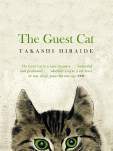
The Guest Cat by Takashi Hiraide
This was my first read of the year, and with cats plus Japan it pretty much had my name on it. Quiet, thoughtful, a mystery that still has me wondering, and some truly delightful descriptions of cats and cat behaviour.
 Station Eleven
– Emily St John Mandel
Station Eleven
– Emily St John Mandel
I’d been looking forward to Station Eleven for months and I was so happy to find it didn’t disappoint. It’s exquisitely plotted, and most importantly wonderfully characterized. I’d been hooked by the description of the post-apocalyptic travelling Shakespeare company, but in the end what has stayed with me most is the before-and-during the breakdown scenes, the moments of realization for those characters, Miranda standing in front of the mirror saying ‘I regret nothing’. A gorgeous tapestry of a novel.
 Mechanique
- Genevieve Valentine
Mechanique
- Genevieve Valentine
Mechanique is another book that had been on my to-read list for a while, and another one that didn’t let me down. Steampunk circus, an inventive narrative style that slowly unveils the hearts of the performers and the dark truths that lie at the centre of their troupe, this fabulous novel explores mortality, desire, ambition, and the beauty of flight.
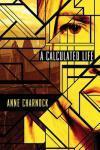 A Calculated Life
– Anne Charnock
A Calculated Life
– Anne Charnock
I was first alerted to A Calculated Life via last year’s Kitschies shortlist. This is a story beautifully and simply narrated, the language economical but evocative, and it remains compelling without ever resorting to sensationalism. A coming-of-age tale exploring what it means to be human, it kept me gripped to the end.
 Escape from Baghdad!
– Saad Z Hossain
Escape from Baghdad!
– Saad Z Hossain
I zipped through Escape From Baghdad in under 24 hours, which says a lot as I’m generally quite a slow reader. For a start, it’s great fun – Hossain’s writing grabs you from the opening line:
“We should kill him,” Kinza said. “But nothing too orthodox.”
From this point on the action doesn’t let up, as three unlikely companions navigate alchemists, immortals and deadly intrigue against the backdrop of post-war Iraq. There are some extremely dark moments, and the humour is correspondingly so (see the torturer who complains he hasn’t been given sufficient time to do his work) but when Hossain wants to make a point he allows the prose to breathe and the emotion to come through. One not to miss.

February 1, 2015
“The Spiders of Stockholm” & The Sunday Times EFG Short Story Award
Some very exciting news which I can finally share – I’m thrilled and delighted to announce that my story “The Spiders of Stockholm” from the anthology Irregularity (Jurassic, 2014) has been longlisted for The Sunday Times EFG Short Story Award!
The 19 longlisted writers and their stories are:
The Indian Uprising by Ann Beattie
The Collected Tricks of Houdini by Rotimi Babatunde
The Ways by Colin Barrett
Fat White Cop with Ginger Eyebrows by Louise Doughty
Qualities of the Modern Farmer by Emily Franklin
The Pier Falls by Mark Haddon
The Glove Maker’s Numbers by Rebecca F. John
A Sheltered Woman by Yiyun Li
Hungry by Elizabeth McCracken
False River by Paula Morris
Interstellar Space by Scott O’Connor
Jules Verne Seeks Dreamers for Long-Distance Travel in Time by Mary O’Donoghue
The Referees by Joseph O’Neill
Lucky by Julianne Pachico
After the War, Before the War by David Peace
Holiday by Mona Simpson
Still Water, BC by Erin Soros
The Spiders of Stockholm by E. J. Swift
The Wedding Cake by Madeleine Thien
The shortlist will be announced on Sunday 1 March. You can find out more about the award and read the stories online here.
“The Spiders of Stockholm” was published in Irregularity, an anthology which explores the tension between order and chaos in the Age of Enlightenment. If you like the sound of “The Spiders of Stockholm”, please do consider checking out this wonderful anthology, and of course, the rest of Jurassic’s titles. Jurassic have a history of supporting new and emerging writers, and producing really beautiful books, inside and out.

January 29, 2015
Tamaruq publication day!
It’s here! Tamaruq, the final volume in The Osiris Project trilogy, is out today. And here it is looking rather lovely alongside Osiris and Cataveiro:
Here’s the cover blurb:
Fleeing from her family and the elitist oppression of the Osiris government, Adelaide Rechnov has become the thing she once feared, a revolutionary.
But with the discovery of a radio signal comes the stark realization that there is life outside their small island existence. Adelaide’s worries are about to become much bigger.
Meanwhile, as rumour spreads on the mainland, many head to the lost city of Osiris with their own devious objectives. But in a world where war is king and only the most powerful survive, there can only be one victor…
If you’d like to order a copy of Tamaruq, you can find the paperback edition through Amazon, Waterstones, or Foyles, and the ebook via Amazon. Or you can support independent bookshops by ordering through Hive.

January 24, 2015
SRFC and an excerpt from Tamaruq
With Tamaruq publication day less than a week away, a quick update to say I’ll be reading at Super Relaxed Fantasy Club, along with Sarah Pinborough and Stephen Deas, next Tuesday 27 January at the Grange Holborn Hotel.
SRFC is organised by Den Patrick and Jen Williams, and it’s always a lovely opportunity to meet other people in the genre community. You can find all the event details here on Facebook.
Tamaruq is released next Thursday 29 January, but in the meantime Del Rey UK have published a free excerpt which you can read on the website here.

January 4, 2015
Best of 2014 and a few things to look forward to
The Christmas tree hasn’t yet gone out, which means there’s just about enough time for the obligatory end of year round-up and looking ahead to what 2015 has to offer.
A few things I loved this year which I’d thoroughly recommend (note – not necessarily published in 2014, but from this year’s reading) – some I’ve written about previously but their merits are well worth reiterating.
The First Fifteen Lives of Harry August by Claire North
With its innovative approach to the time travel narrative and clever use of format echoing theme, this was a fantastic read, intricately plotted, with a proper punch of an ending.
The Girl in the Road by Monica Byrne
A brilliantly-realized near future setting in India/Ethiopia, combined with a sharp, vibrant voice and nods to mythology made this one of my favourite reads of the year.
The Race by Nina Allan
With its beautifully crafted, intertwining narratives, an evocative sense of place and dreamlike playfulness with reality, I would love to see both this and the Byrne on some awards list later this year.
H is for Hawk by Helen MacDonald
The story of how Macdonald trained a goshawk in the months following her father’s death, and the story of the troubled writer T.H. White. A gorgeous, deeply empathetic memoir.
MaddAddam by Margaret Atwood
I adored Oryx and Crake, but was less enamoured with The Year of the Flood. I was delighted to enjoy the conclusion to the trilogy as much as I did the first volume – Atwood never fails to surprise and delight with her inventiveness and style.
The Rabbit Back Literature Society by Pasi Ilmari Jääskeläinen
Engaging and ever-so-slightly unnerving story of a novice writer who finds herself embroiled in the dubious clique of the eponymous literature society, this is a marvellous read.
A Man Lies Dreaming by Lavie Tidhar
I enjoyed The Violent Century but this is much closer to the territory of Tidhar’s Osama – intelligent, troubling, funny, at times harrowing, an emotional rollercoaster from start to finish.
And a few things I’m looking forward to in 2015, in no particular order:
Company Town by Madeleine Ashby, Persona by Genevieve Valentin, The Wolf Border by Sarah Hall, The Buried Giant by Kazuo Ishiguro, The First Bad Man by Miranda July.
Next on the reading list is Station Eleven by Emily St John Mandel, which I’ve been looking forward to for ages, and I’m just waiting for the paperback editions of Kamila Shamsie’s A God in Every Stone and Siri Hustvedt’s The Blazing World.
Plenty to look forward to in 2015.

October 3, 2014
TAMARUQ cover
Nothing makes you so happy as a writer as the day you get to see the cover design for a new book, and I’m thrilled to share the artwork for the forthcoming TAMARUQ. Del Rey have produced three beautiful covers for The Osiris Project trilogy and this one might be my favourite yet. A big thank you to the designers for all their work.
And here’s the three covers together – I can’t wait to see the set in print!
TAMARUQ is released on 29 January 2015.


September 20, 2014
Reading recommendations – summer 2014
Some recommendations from the last few month’s reading – wonderful books all:
I stumbled across A Woman in Berlin in the history section of the beautiful Scarthin Books in Derbyshire – one of those oh this looks interesting moments that reminds you to browse bookstores more. The diaries of a German woman – a journalist in her pre-war career – during the final phases of WWII, it chronicles the Russian invasion and sacking of the city of Berlin. It’s a rare first-hand record of the civilian experience of defeat, and the history of its publication is equally fascinating – the first German-language edition in 1960 received such negative reactions that the text was withdrawn, and it was only in 2003, following the anonymous author’s death in 2001, that it saw print again. With its subject matter of rape and sexual collaboration for survival, this is not the easiest read, but what stays with me is the voice of the narrator; the resilience, the dry humour and lack of self-pity, the will to survive. I was especially struck by the author’s reflections on the returning soldiers. The myth of man, she says, has crumbled – ‘That has transformed us, emboldened us. Among the many defeats at the end of this war is the defeat of the male sex’ – an observation which sadly was not to be proven in the post-war era, but makes this even more of a relevant read today.
 A Tale For The Time Being
– Ruth Ozeki
A Tale For The Time Being
– Ruth Ozeki
A Japanese schoolgirl writes a diary which in the aftermath of a tsunami washes up on a remote coastline in Canada in a Hello Kitty lunchbox. I loved the premise of this. Nao’s diaries are instantly engaging (so much so that I missed her initially during Ruth’s chapters); inspiring and heartbreaking all at once. As Ruth becomes immersed in Nao’s diary, the novel expands to reveal the fascinating histories of Nao’s family, including her ‘anarchist-feminist-novelist-turned-Buddhist-nun’ great-grandmother Jiko, her kamikaze pilot grandfather Haruki #1, and her post-Dot Com Bubble computer programmer father Haruki #2. Exploring the dynamics of power and bullying, Ozeki examines what it really means to be a hero.
 The Hired Man – Aminatta Forna
The Hired Man – Aminatta Forna
I was blown away by Forna’s memoir, The Devil That Danced on the Water, and her novel The Memory of Love. The Hired Man is outwardly a quieter novel, but one that creeps up on you with increasing power. Protagonist Duro creates a slow-burn narration, flitting between a seemingly peaceful present, and the darker memories of the past, as the secrets of a Croatian town in the aftermath of civil war are gradually uncovered.
 The First Fifteen Lives of Harry August – Claire North
The First Fifteen Lives of Harry August – Claire North
The First Fifteen Lives of Harry August has an outwardly simple premise: narrator Harry lives, and dies, and lives his life over and over again, each time retaining the memories of his previous lives. The way it is told is gorgeously intricate. I loved the circular narrative, the employment of form to echo theme, as the book moves back and forth through Harry’s lives, with some playful and at times truly dark historical visitations. The relationship between Harry and his one-time student Vincent is fascinating; as are the philosophical debates eschewing from that relationship. This is a great read from start to finish.
 The Girl in the Road – Monica Byrne
The Girl in the Road – Monica Byrne
Two journeys are at the heart of The Girl in the Road – Meena, fleeing from India across the Trail, an energy-harvesting floating bridge which crosses the Arabian Sea. And Mariama, a young girl crossing from West Africa to Ethiopia, bewitched by fellow traveller Yemaya, who she worships as a goddess. There were so many things I loved about this – the wonderfully-rendered near future setting; the way the two characters’ journeys intertwine through stories and mythology; the fierce, at times savage voice combined with a gorgeous use of language. I also liked the way it touched on issues such as race, class, sexuality and mental health, whilst not foregrounding any of these; the narrative always comes first.
 A Bad Character – Deepti Kapoor
A Bad Character – Deepti Kapoor
Kapoor’s A Bad Character explores a very different Indian setting. Sometimes after reading something particularly epic it’s a joy to really focus down, and Kapoor’s novel is exactly that: a distillation of a relationship. Poetic, evocative, burning with suppressed desire and sexuality, it’s told in a series of staccato vignettes by a young woman in Delhi whose name we never learn.
 H is for Hawk – Helen Macdonald
H is for Hawk – Helen Macdonald
If you read one thing this year, read this. Macdonald’s deeply empathetic memoir encompasses two narratives: it’s the story of how she trained a goshawk in the aftermath of her father’s death, and the story of the troubled writer T.H. White. It’s a book about nature and a book about struggling with grief. By turns exquisitely poetic and unflinchingly raw, Macdonald explores what it means to be wild and what it means to be human, and the at times perilously precarious bridge between the two.



